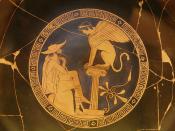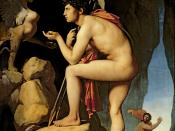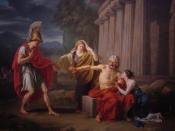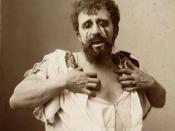The Tragic Hero"Oedipus the King", by Sophocles is a tragic play, which illustrates the Greek concept that one cannot escape fate. Oedipus was born with a horrible prophecy told to his parents King Laius and Queen Jocasta of Thebes, that he would kill his own father and marry his mother. By trying to avoid what the oracle had foretold of his life Oedipus at the same time fulfilled the prophecy. Fate is one of the many themes in the play, such an unlike idea may seem unimportant, but one can find many themes in the play. The theme of fate versus free will creates conflict in the play that helps the action to move forward and help to develop the characters. Oedipus tried to escape the oracles prophecy: however, fate controlled the lives of the characters in this play.
To begin, Prophecy plays a big part in Oedipus the King, the play begins with Creon's return from the oracle at Delphi.
Later we hear Oedipus tell Jocasta of a prophecy he heard as a child Jocasta then tells Oedipus of a similar prophecy which was giving to Laus. It is ironic how fate creates such conflict between characters in the play and how free will not only affects but also alters their lives. A Greek, Sophocles, wrote Oedipus the King. During this time, the Greeks believed that everything was done for the gods; they did not have free will over their lives.
"Fear?What should a man fear? It's all chance,chance rules our lives. Not a man on earthcan see a day ahead, groping through the dark.
Better to live at random, best we can.
And as for this marriage with your mother-have no fear. Many a man before you,his dreams, has shared his mother's bed.
Take such things for shadows, nothing at all-Live, Oedipus,as if there's no tomorrow!" (935 lines 1068-1078)Again in this play, and the other Theban plays, return to the fact that prophecies do come true and that the words of the gods must be obeyed. As one critic agrees, "While dimly aware of an unfortunate fate, Oedipus chooses to defy what he thought fate had designed for him, and become a self-made man. In this, he has been amazingly successful⦠(Whitman 344). There are many examples in the play, in which the gods control and tell the people, what they should do or how they should live their lives. For instance, at the end of the play Oedipus asks Creon to banish him from Thebes:Drive me out of Thebes, in exile.
Not I. Only the gods can give you that.
Surely the gods hate me so much-You'll get your wish at once⦠(949-50 lines 1666-68).
Creon and Oedipus discuss here how they have no control over their lives, decisions and all. The gods are the ones who make all of the choices. Oedipus, along with the rest of the Greeks, believed that he had no say in the way his life was going to turn out. He believed that it was destined for his life to end the way it did, with him being curse and banished from Thebes.
Shophocles tells us that Oedipus is a victim of fate, but not a puppet because he freely sought his doom though warned not to pursue it, when he states:Oedipus: Some man at a banquet who had drank too much shouted out-he was fargone, mind-you- that I am not my father's son. Fighting words! I barely restrainedmyself that day but early the next I went to mother and father, questioned themclosely, and they were enraged at the accusation and fool who let it fly. So as formy parents I was satisfied, but still this thing kept gnawing at me, the slanderspread-I had to make my move. And so, unknown to mother and father I set outto Delphi and the god Apollo spurned me, sent me away denied the facts I cameforâ¦(930)Fate may have determined his past actions but, what he did at Thebes he did as a free individual. It was his own choice to kill the men at Phocis, his own choice to marry Jocasta, and his own choice to learn the truth. This conflict helps the play to move forward, as he claimed responsibility, as a hero would, because his own pride blinded him from the truth. As Dodds writes his analysis on the quote above. "The story of Oedipus fascinates us because of the spectacle of a man freely choosing, from he highest motives, a series of actions which lead to his ruin." (Dodds 23). Although warned, Oedipus continued to search for the thruth and solve the mystery of his birth. In the process he challenged the words of the shepard which led to his ruin. "Oedipus could leave the city of Thebes and let the plague take its course but pity for the sufferings of his people compelled him to consult Delphi." (23). Even though fate victimizes Oedipus, his heroic qualities, and his loyalty to Thebes, makes him the tragic hero.
Furthermore, the characters in the play allowed fate to take its toll with the choices they made. One example is when the shepherd made the decision to spare Oedipus's life. That is the first step on the road to his fate. Another example is when the Old shepard revealed the truth about Oedipus's father.
"O god-all come true, all burst to light!O light- now let me look my last on you!I stand revealed at last-cursed in my birth, cursed in marriage,cursed in the lives I cut down with these hands!"(941 lines 1305-1310)That is the second step on the road to his fate. When Oedipus left Corinth, he opened up the third step on the road to his fate. He then made the decision to kill a man, who turned out to be his father. That is the fourth step on the road to his fate. Finally, Oedipus became the king of Thebes and married his own mother, which is the last step on the road to his fate. He did exactly what was prophesied, by the decisions that he and the people made. As this critic analyzed:Oedipus has a special affinity with the gods, by which his personal arête workswonders; he chooses action instead of safety; all that remains is for him to destroyhimself, which of course follows. As he dismisses the suppliants, he summarizeshimself and his position as principal in the tragic action: he will solve this newriddle, (who murder Laius), as he solved that of the Sphinx (theme of knowledge);he will vindicate the land and the god (theme of action and closeness to divinity);he will not spare the murderer even to help himself (theme of self-destruction).
From the prologue alone we can recognize Oedipus for what he is. Aristotle to thecountry, he is "superior virtue"; the people regard him nearly as a god for hisintelligence, and Oedipus himself recognizes his birthright at once and hisresponsibility when he accepts the challenge to act in the face of a daimonion- a"divine" affliction of fate." (Whitman 126).
Throughout the play you see Oedipus get broken from fate and trying to escape it. It would seem that he would lose all hope because no matter what he does, the prophecies laid out for him keep coming true. Sophocles was probably trying to say to just live your life. You can't change your fate, so why not just keep it a surprise? Don't waste your time with oracles and don't try and control your fate.
To continue the manipulation of fate versus free- will is also illustrated in the play when queen Jocasta found that she and king Laius were to have child, she went to consult an oracle for guidance. However, Tiresias had a devastating prophecy that their first-born son would kill the king his father, and marry his mother. Jocasta, out of free will tried to prevent the prophecy from being fulfilled. As she upon the birth of her son, she pierced the baby's feet with an iron pin to prevent the baby from using his feet.
Your ankles⦠they tell the story. Look at them.
Why remind me of that, that old affliction?Your ankles were pinned together: I set you free.
That dreadful mark-I've had it from the cradle.
And you got your name from that misfortune too,the names still with you. (936 lines 1131-1136)Jocasta's action backfired, as Harold Bloom describes, there are important details in this exchange. First, there is a play on the word for feet that seems to allude to the Sphinx's riddle. Oedipus' own name can be constructed as a pun on the word for feet. Although it more literally means "swollen foot," referring to the piercing of his ankles when he was exposed as a child, it could also mean "know foot," because the "Oed" part of his name is ambiguous. (103)Then, Jocasta ordered a shepherd to abandon the child in the mountains, to be left to die. The shepherd, in spite of his order from the queen, gave the baby, instead, to one of his friends, a herdsman from Corinth. The herdsman gave the baby to his master, the king of Corinth. It was with this family that Oedipus grew up not knowing his real family or the fate that awaited him. Oedipus is doomed to his fate regardless of Jocasta's attempt to escape fate. She tries to escape by using her own free will but, in the end, both face their fate. The only way Oedipus could have escaped the fate that was prophesied to him was to have been killed when he was born.
In conclusion, the theme of fate versus free will creates conflict in the play that helps the action to move forward and helps to develop the characters, in particular Oedipus and Jocasta. Sophocles did a magnificent job at portraying a tragic play, in order to reveal what was really happening at that time when people were battling between the faith of the gods or the people's free will.
Works CitedBloom, Harold, ed. Sophocles' Oedipus Rex. New York: Chelsea House, 1988.
Dodds, E.R. On Misunderstanding the Oedipus Rex. Twentieth Century Interpretations ofOedipus Rex: New England Journal of Physiology. Ed. New Jersey:Prentice-Hall, 1968. 23.
Sophocles. "Oedipus the King." Literature and the Writing Process. Ed. ElizabethMcMahan, Susan X Day, and Robert Funk. 8th ed. New Jersey: Upper Saddle River:Prentice, 2007. 949-950.
Whitman Cedric Hubbell. Sophocles: A study of Heroic Humanism. Cambridge: HarvardUniversity Press, 1951.
Whitman-Raymond, Lee. "Defects and Recognition in Sophocles' Oedipus Rex."American Journal of Psychoanalysis. 65.4 (December 2005): 341-352. Springer Link.
Springer Science & Business Media. Academic Lib., Arizona Western College. 4 Mar.
2008 .





